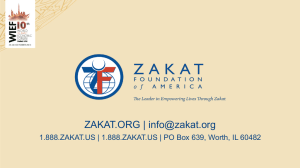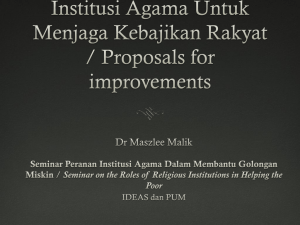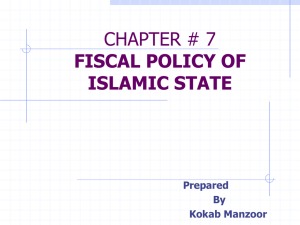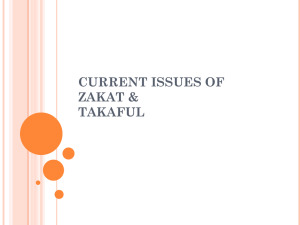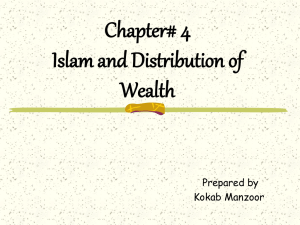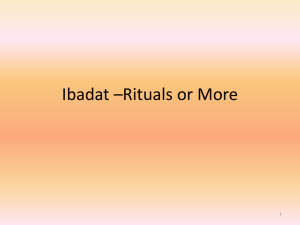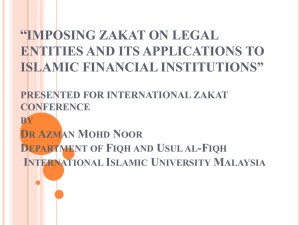THE COLLECTION AND DISTRIBUTION OF ZAKAT IN MALAYSIA
advertisement
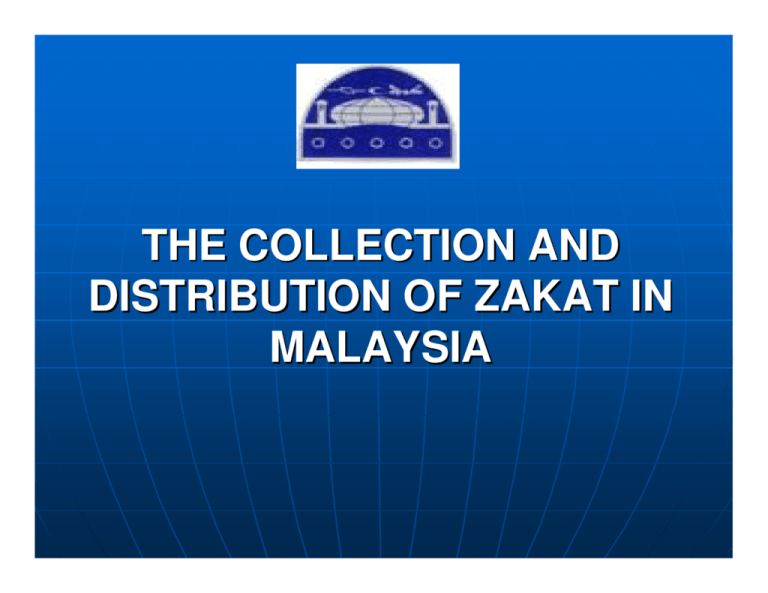
THE COLLECTION AND DISTRIBUTION OF ZAKAT IN MALAYSIA 2006 (RM) State Zakat Harta Zakat Fitrah Total W.P 143,304,403.0 8 4,283,495.4 147,587,898.48 0 Selango r 149,943,584.6 9 9,892,668.1 159,836,252.79 0 Johor 46,478,287.95 8,254,654.5 0 54,732,942.45 Sources of Zakat Fund Zakat on business Zakat on agriculture Zakat on Savings Zakat on livestock Zakat on mining Zakat on earnings zakat fitr. TYPES OF ZAKAT 2004 2005 2006 Paddy Zakat 1,538,685.97 1,810,399.95 1,744,606.95 Property Zakat - Savings Zakat - Salary Zakat - KWSP Zakat - Share Zakat - Crops Zakat 20,313,628.02 24,967,985.78 32,983,062.04 348,750.00 424,610.00 499,420.00 253,854.20 264,811.15 260,795.79 Building and Appliances Rental 1,588,626.00 1,140,479.00 1,684,368.92 Others 997,367.17 AMOUNT 25,040,911.36 Zakat Al-Fitr Paddy Field and Land Rental 1,530,970.81 30,139,256.69 1,977,257.74 39,145,262.29 Method of Collection 1. Collection by appointed staff 2. Collection through offices of the state religious department 3. Collection through salary deduction Calculation of Zakat a) Zakat For Income The meaning of salary is someone income from his services with the employer or somebody or company or institution. For example : Annual salary, arrears salary, variety allowance (transport, food, meeting) and others (including bonus and anything which can be describe as income). Method A 2.5 % on the amount of income per year. Example : RM 1,500,00 x 12 month = RM 18,000.00 Rate of Zakat that should be paid is: RM 18,000.00 x 2.5 % = RM 450.00 per year RM 450.00 per year divided with 12 month = RM 37.50 Method B The income per year will be deducted with the life requirement (basic) per year. A was married and his salary is RM 1,500.00 per month x 12 month = RM 18,000.00 per year. Then, the salary is deducted to the household expenses including himself (per year) RM 8,000.00, his wife (per year) RM 3,000.00 and his child (each one) RM 8,000.00. The amount is RM 11,800.00 minus to the per year income per year = RM 6,200.00 per year. Therefore the rate of Zakat is: RM 6,200.00 x 2.5 % = RM 155.00 per year RM 155.00 per year will divided with 12 month = RM 12.91 per month Zakat of KWSP Two views:1. to pay when retire 2. to pay every year when the conditions are correct even the money still in KWSP. The rate of Zakat is 2.5 percent Zakat of Agriculture Paddy price = 1 kilogram =RM0.60 Subsidy price = 1 kilogram= RM0.24 Price of paddy per KG =RM 0.84 RM 0.84 X 1,300.49 kilogram (5 Ausuk equal to 2 Kunca 2 Nalih 6 gantang) = RM 1,102.94 The rate of PaddyZakat is 1/10 RM 1,102.94 X 1/10 = RM 110.29 Tax Incentive The Income Tax (Reduction from Retired) (Amendment) Act 2000 anybody who pays Zakat will enjoy rebate for their income tax. But this amendment only covers an individual. How about a company? Law Related on Zakat Collection The penalties vary from state to another Eg. Kedah- Only zakat on agriculture is required to pay at the office. Eg maximum penalty RM500 minimum RM10 Reason for Weak Enforcement 1. No database of zakat payer 2. Unwillingness of zakat officer to list down those who fail to pay zakat 3. Shortage of staff 4. No zakat laws give the authority to zakat officer to investigate Zakat Distribution in Malaysia Basis of distribution: 1. Principle of IstiabTo distribute to all asnaf 2. Principle of had alkifayah Sufficient to asnaf 3. Principle of Khususiah Special to specific asnaf Cont.. 4. Principle of Istiqlal Zakat property should be separated from other property 5. Principle of Iqtisad Smart distribution 6. Principle of Musuliyat al-amil Amil responsibles upon his collection 7. Principle of al-riabah Good safekeeping Cont… 8. Zakat collection should not be allocated for general expenses 9. Zakat collection should not be utilised to cover Majlis expenditure 10. Zakat collection should not be used to build mosque, bridge, road, school and etc. Basic Criteria for Distribution 1. 2. 3. 4. 5. 6. Accommodation Food Education Health Clothes Transportation Interpretation of the Beneficiaries Faqir- The Poor of Straitened Means ))الفقراء. These include all Muslims whose means are, in spite of their best efforts or due to some physical disability, insufficient to adequately provide for the basic lawful material necessities of life such as food, clothing and shelter. income under 50 percent from their needs for life. The Poor Destitute ))المساكين. These include all Muslims whose means are, lacking or are so deficient as to deny them the basic lawful material necessities of life. income more than 50 percent from their needs for life. individuals below nisab The real poor people can be defining as people who earn RM529 per month and above. the group of people who are closely to be poor can be defining as people who earn RM1200 per month The Zakat Officials Zakat-officials, who regularly serve as members of the various Zakatstaffs, are entitled to receive remuneration payable out of the Zakat funds Amil includes:• • • • The collectors ))المصدقون, whose duty it is to collect the Zakat dues and deposit them in the authorized Zakatcentres. The distributors ))القسامون, whose duty it is to apportion the Zakat funds. The custodians ))الحافظون, whose duty it is to keep safe and disburse the Zakat funds to the lawful beneficiaries. The custodians include : the treasurers – the caretakers of the Zakat granaries and Zakat storehouses and the caretakers of domestic animals levied as Zakat (shepherds, herdsmen, waterers). Cont… • The measures ))الكيالون, to measure or weigh the cereals and other kinds of agricultural produce levied as Zakat. • The scribes or clerks ))الكاتبون, to keep the Zakat files and records. • The accountants ))الحاسبون, to keep account of the Zakat revenue and expenditure. • The informers ))العارفون, to seek out those persons who are deserving of receiving Zakat assistance and to inform the Zakat-officials of their condition and whereabouts. Cont… • The assemblers ))الحاشرون, to assemble the Zakat-payers or the beneficiaries of Zakat, when required. • The officers in charge ))رؤساء العاملين, to direct and manage the various Zakat-centres and responsible to the state and to the public for the proper functioning of their respective centres. Those their Hearts are reconciled (to Islam)))المؤلفة قلوبھم. the Quran included the new converts in the category of lawful beneficiaries of Zakat, solicitude of Islamic brotherhood. The slaves and Captivates )الرقاب Zakat funds may be used to assist newly enfranchised slaves, whose former masters were either non-Muslims or Muslims The term of Riqab has further been interpreted as applying to those Muslims who have fallen prisoner into the hands of the enemy. Hence, it is generally agreed that, whenever such action is possible, Zakat funds may be to ransom Muslim prisoners of war. The Debtors )الغارمون All debtors who find themselves unable to repay their debts without suffering undue distress or destitution, or who are absolutely unable to do so being devoid of all means of subsistence, may lawfully seek relief from their burden through the agency of Zakat the debtor is in genuine difficulty or truly needy For the cause of Allah )فى سبيل lawful warfare for the defense of Islam and of the Muslim peoples and territories collective efforts which are directed toward reducing hardships arising out of emergencies of any nature – natural calamities, famine, war or others The wayfarer )ابن السبيل Category of people who, for some valid reason are unable to return home temporarily or permanently. This would include people facing religious or racial persecution, political exiles or refugees, those seeking safety from oppression and those pursuing knowledge and education or involved in satisfying meritorious social wants away from home. For such people, Zakat serves as a social insurance fund, the medium of temporary help until they can stand on their own feet Problems with Zakat System 1. Lack of commitment and management expertise Not academically or professionally qualified 2.Lack of database No comprehensive database on zakat payer. 3. Legal aspects Weak law on zakat Cont… 4. Zakat payment through unofficial channel and unpaid zakat Weak enforcement 5. To what extent the distribution of zakat in Malaysia meets its objectives Zakat is not really transferred from the wealthy to the poor. Zakat is collected mainly to farmers and government servant. Less than 10% zakat on business. Proposed Reforms 1. Education system 2. Role of ulama 3. To improve zakat laws and enforcement 4. To improve zakat administration 5. Establishment of consultancy services network 6. To improve the corporate governance of zakat administration
